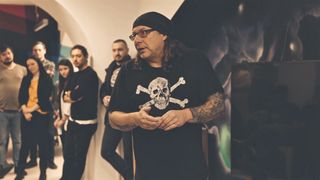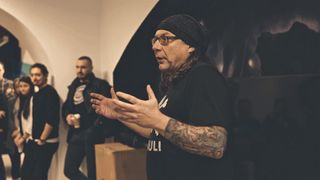Robert Knapp is not the typical CEO of a VPN company. Bearing large tattoos on both arms with the look of a rockstar and an uncanny habit of saying things about privacy that sit at odds with his peers, Knapp is happy to sit in the limelight to defend his ideals and his beliefs.
TechRadar Pro sat down with him for a frank and open interview to explore his plans for CyberGhost and how educating people about privacy is perhaps the best path for a safer online world.
1. You prefer to call CyberGhost a Privacy Service Company instead of a VPN company. Why?
Since day one, our mission has been to democratize data privacy and turn it into a daily practice. There are three things we need to achieve to get there:
First, to help people all over the world have a privacy and security-first mentality through education focused on this issue;
Second, to enable easy access to the technological and educational resources they need to act on what they learn;
Third, to give them easy to use and reliable tools to use to get their privacy back and strengthen it as they move through life, both online and offline.
We don’t see CyberGhost as a VPN company because our purpose is to help build privacy into a habit for as many people as possible. We're a technology company that focuses on privacy. No matter the products we build or will develop in the future, our focus will remain to secure people's data and ensure that their right to privacy is respected.
When data privacy reaches mass adoption, that’s the tipping point that will lead us to change the face of the Internet and technology in general.
2. What differentiates CyberGhost from the competition?
Our focus as a team, as a company is to build a great product, the best of its kind. We put our work behind developing a reliable VPN you can use daily and a transparent company you can trust.
An important part of our work is to come up with better ways of doing things, either in terms of features or performance or technology.
That's why, over time, we added more layers to CyberGhost VPN, such as the ability to block malicious content or block ads or even set CyberGhost to start before certain applications you choose to ensure you never go online unprotected (you'll find this in settings, under App Protection).
But being better than someone else means nothing if you're not a company people can trust. Trust is essential for any privacy and security-focused company, especially because it's difficult to earn and so easy to lose!
The massive number of data breaches and cyber attacks that leak millions upon millions of records packed with personal information are making it even more difficult to earn this trust.
The CyberGhost way is to be transparent, helpful, fair and honest to our users, supporters and anyone who wants to find out why we do what we do.
As people become more acutely aware of how their data is being handled and used, they will become increasingly stricter in evaluating the companies they choose to hand over their personal information to.
We built CyberGhost as a company we trust our own data with and we'll continue to treat our users and customers just like we want to be treated.
3. What unusual steps does CyberGhost take to ensure the privacy of full data?
One of the most important things we do to ensure that CyberGhost is a strong product that ensures full privacy for any of its users is that we keep no logs. This has always been our policy and it's how we walk the talk.
We also carefully select the servers that are part of our infrastructure. Neither of our over 1300 servers spread across 60 countries is chosen randomly.
There were cases when we came across technical problems that we considered to be dangerous to our users in terms of privacy and security. To deliver on our mission, we chose to remove the servers from those countries.
You'll also see my talking a lot about the work we do at CyberGhost. This is one of our ways to build and maintain transparency. It also helps us to get feedback, to face criticism openly and to learn how we can improve day by day.

4. Nearly 20 years ago, Scott McNealy (CEO of Sun Microsystems, later acquired by Oracle) told journalists, "You have zero privacy anyway, Get over it". Was he right all the way? Is privacy, as he put it back then, "a red herring"?
Privacy is not unattainable, but it is a privilege nowadays.
Privacy is not a default setting either. Enjoying your privacy and protecting it requires determined actions.
If you don't encrypt your data, you won't have privacy online.
If you choose to indulge in oversharing in social media, you can expect your data to be used against you in some way or another.
Don't expect your government to ensure your data privacy is respected because you might be disappointed. And by "might be" I mean "surely will be".
As internet users, we need to take ownership and responsibility for our privacy. This means not only making a statement but acting on it.
It's up to us to protect our identity and our information by making informed decisions about the digital products we use, about the data we share and about the companies we trust with our personal information.
I urge you to pay attention to how laws change in your country when it comes to data protection and privacy. Get involved. Don't expect, don't assume.
Encrypt your data with a reliable VPN, use strong passwords, don't share confidential information with just anyone, don't check in on Facebook at home. There are so many small things you can do (or stop doing) to protect your data! You just have to start somewhere. Anywhere.
Don't expect your government to ensure your data privacy is respected because you might be disappointed. And by "might be" I mean "surely will be".
Robert Knapp
5. How do you see the future of VPN evolving?
VPN technology will grow by combining more advanced technology with insight into what people really need. Privacy and security are deeply personal and emotional choices. If you want to get them right, you need to deeply understand human psychology.
The CyberGhost team will continue to fight for democratizing access to this type of technology and its potential to provide unrestricted access to content around the world.
I hope that VPN companies, big and small, will truly do their best to deliver on the promise they make to their users: online privacy and anonymity. This might mean not giving into requests such as those to use "responsible encryption" through which law enforcement agencies try to get tech companies to grant access to their database as a solution to defeat terrorism.
At the end of the day, the best way to protect data is not to store it at all. This may not always be possible, but it is a viable solution in many more occasions than it seems at first.
6. Can you give us a few hints of what's coming up for CyberGhost users in 2018?
You can expect to see a revamp of all CyberGhost products this year. We will continue to build towards making CyberGhost VPN as easy to use as possible, while keeping the infrastructure strong and suited to our users' specific needs.
We also want to give the chance to each user to make CyberGhost their own. It's all part of building the type of product we love to use ourselves, that makes our lives easier, a lot more secure and especially private online.

7. Why has CyberGhost stopped doing a free version of its offering?
If you take a step back and look at the big picture of things, you'll most likely see that there are two ways of doing business online these days:
- Gather as much data about Internet users as possible and make money using or selling these details.
- Build a great product or service that actually helps people and that Internet users are willing to pay for because they find it valuable and useful.
Our goal is to continue to grow as a sustainable business by making money through a reliable, useful product that doesn't need users' data to grow.
We want to make a dent in the universe, to help internet users choose products and services that don't need their data to thrive.
This is one of the reasons we decided to discontinue our free product, which will be phased out gradually.
Another reason is the fact that we want to ensure that CyberGhost VPN delivers a best-in-its-class experience each time someone clicks the "Start Protection" button. This requires heavy investments in infrastructure, which we've been making and continue to make to deliver on our promise to our customers.
We can compare data security and privacy to medicine: maintaining a healthy life requires a small investment. Prevention is always better and much cheaper than the cure. Any cybercrime victim could confirm that, and you can evaluate this yourself by thinking of the last time you or a loved one had to treat an illness.
We never used our free users' data as other companies do (meaning for tracking their moves and advertising to them accordingly). And because we want to continue to help everyone who seeks it to gain unrestricted access to the Internet and its resources, we've created two extensions that include a proxy built on the blockchain. They're available both for Chrome and Firefox and they can be accessed even in countries where our website is blocked (because they're built on the blockchain).
8. Recent surveys show that VPN penetration worldwide hovers between 20 and 25% despite privacy concerns being at an all-time high. What do you think needs to be done to make VPNs an essential part of your digital life?
In order to drive VPN mass usage, we need to come at it from several angles.
We need to lower the barrier to adoption. This means cutting down the tech talk to a minimum and explaining in plain terms what a VPN does and why everyone needs to use it. Until recently, VPNs were only used by people with tech knowledge, who knew how to evaluate these products and how to make the best use for them. That needs to change even more in the following years.
Another way we can help people pay more attention to their privacy and start using a VPN is to educate internet users. This is particularly important for younger generations, starting with children in school. Because they grow up with technology, they may take it for granted and become impervious to the dangers it comes with, both in terms of privacy and security.
Data leaks and legislation changes, such as the repeal of net neutrality in the US, are also making an impact on the VPN adoption rate. The landscape is not likely to change for the better in the next few years, unless we all make a concerted effort to demand privacy be respected, protected and valued as it should be.
- Securing your digital lifestyle doesn’t have to be a tedious or expensive process. You can achieve that in the next 60 seconds by subscribing to CyberGhost VPN here, risk-free, 30 days money back guarantee.
Are you a pro? Subscribe to our newsletter
Sign up to the TechRadar Pro newsletter to get all the top news, opinion, features and guidance your business needs to succeed!
